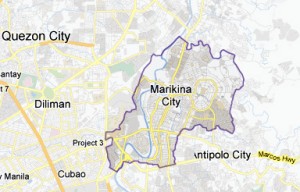Resident asks court to scrap ban on pets in some parts of Marikina

Alma Manzano, who lives in a resettlement area in Barangay Fortune, asked the Marikina Regional Trial Court on Friday to strike down Section 2 of Ordinance 13, Series of 1997; Sections 14 and 37 of Ordinance 67, Series of 2003; Sections 34 and 52 of Ordinance 62, Series of 2007; and Section 146 of Ordinance 188, Series of 2008.
These regulations prohibit pets within resettlement areas within the city supposedly for the promotion of public health and safety, and provide penalties ranging from simple citation tickets to fines of from P500 to P5,000, and even imprisonment of up to a year, for violations.
Apart from asking for a permanent injunction, Manzano, who was charged in 2012 with violation of Section 34 of Ordinance 62 after authorities found a dog in her house, asked the court to issue a writ of preliminary injunction to prevent local officials from implementing the ordinances while the court studies the merits of her petition.
Manzano, who had to pay a fine and remove the dog from her house in exchange for the dropping of the charge against her, was assisted by Anna Cabrera, Philippine Animal Welfare Society executive director, in filing the 20-page document at the Office of the Clerk of Court. The legal document was prepared in the petitioner’s behalf by the University of the Philippines’ Office of Legal Aid.
In seeking an injunction, Manzano said the prohibition of pet ownership “violates the settled principle” that local governments can only regulate “acts which are not prohibited by national law.”
Article continues after this advertisementThe national laws pertinent in this case are the AntiRabies Act of 2007 or RA 9482, which seeks to prevent the spread of rabies in communities, but does so “through regulatory measures;” RA 8223, which, among others, merely “regulate(s) the keeping of animals in homes…;” and the Animal Welfare Act of 1998, which calls for the regulation—not prohibition—of “the establishment and operations of all facilities utilized for breeding, maintaining, keeping, treating or training of all animals…as household pets,” she said.
Article continues after this advertisement“The lack of such prohibition on a national level implies that also as a matter of national policy, ownership of companion animals such as dogs is a right, and thus may only be regulated, not prohibited outright,” she said.
According to Manzano, the assailed provisions also “violate the equal protection clause” enshrined in the Constitution.
She said they, after all, are “discriminatory” as they “single out residents of resettlement areas, or those living in the ‘dahop na pamayanan’ (poorest areas).”
She said the city government “has also failed to show how banning dog ownership among those in resettlement areas is germane to the purpose of promoting public health and safety.”
“If the respondent city wishes to make resettlement areas safer, healthier to live in and rabies-free, then this goal is served by complying with sections 25, 32, and 33 of Ordinance 62, Series of 2007; and section 5 of RA 9482,” she said.
The first requires residents to have their pets registered in a bid to control and prevent the spread of rabies; the second requires them to give their pets antirabies vaccination; and the third prohibits the roaming of animals in public places.
Section 5 of RA 9482 details the responsibilities of pet owners, including giving the animals antirabies vaccination, and giving them “proper grooming, adequate food and clean shelter.”
“Again, the city has not shown that residents of resettlement areas cannot do this,” she said.
She added the assailed provisions were also “overbroad,” a violation of the Constitution.
This was because she said they put forward “the most restrictive and oppressive means possible—prohibition—instead of regulation and enforcement of existing laws in promoting public health and safety.”
“When less restrictive solutions such as regulation are available, then more restrictive solutions such as prohibition (are) unnecessary,” she said.